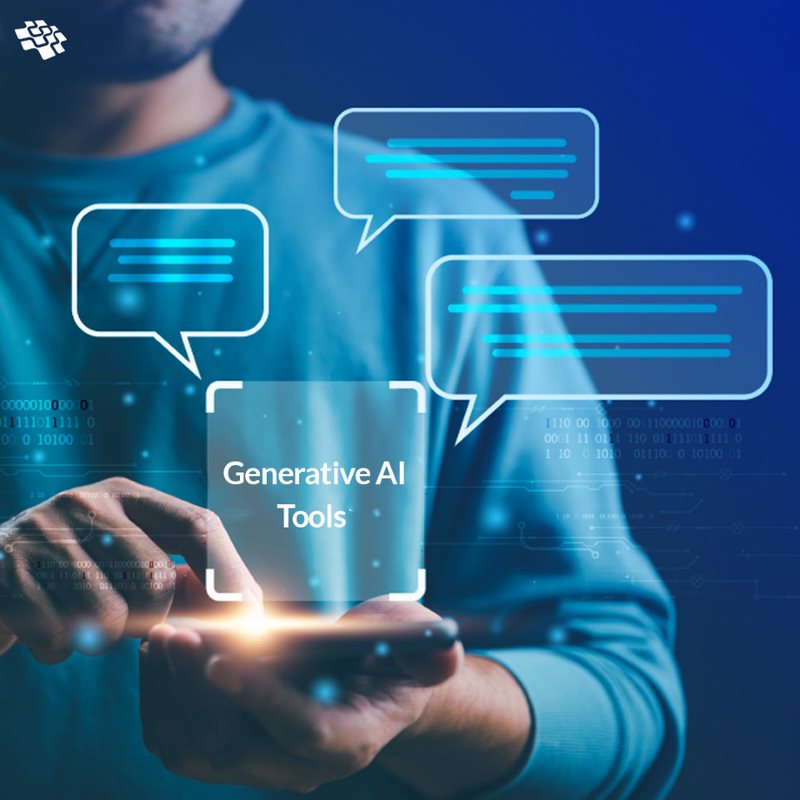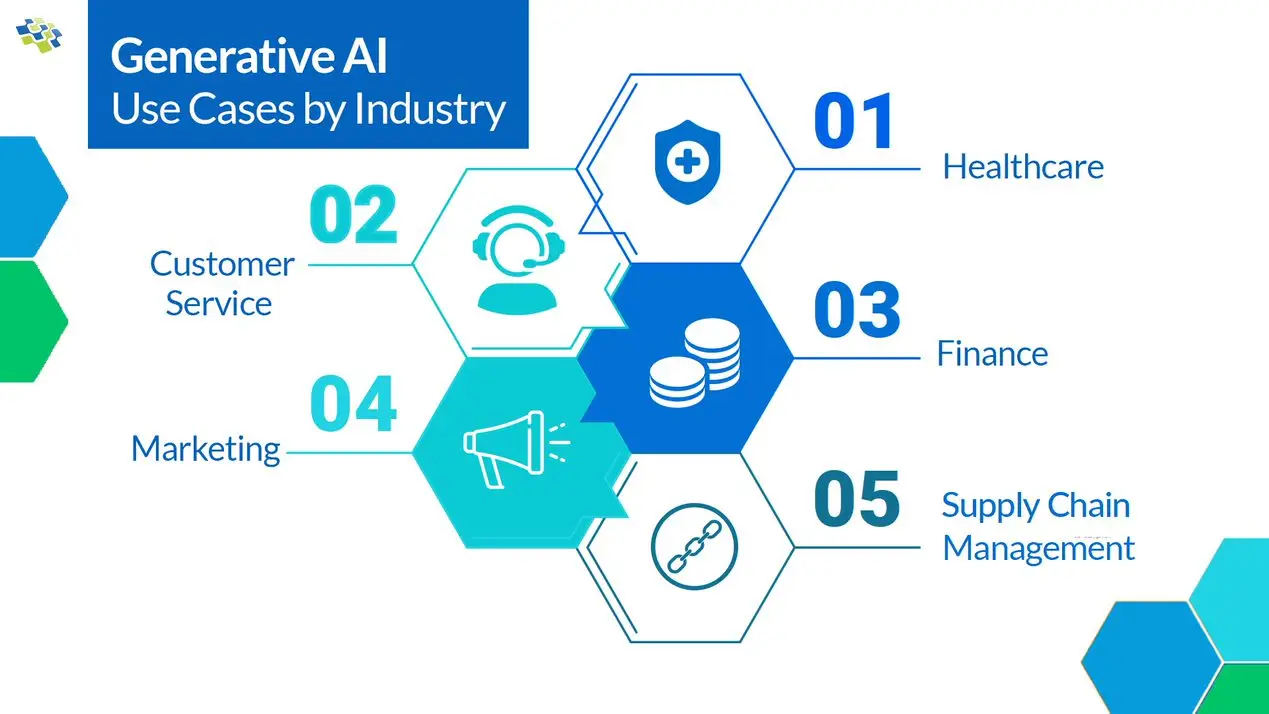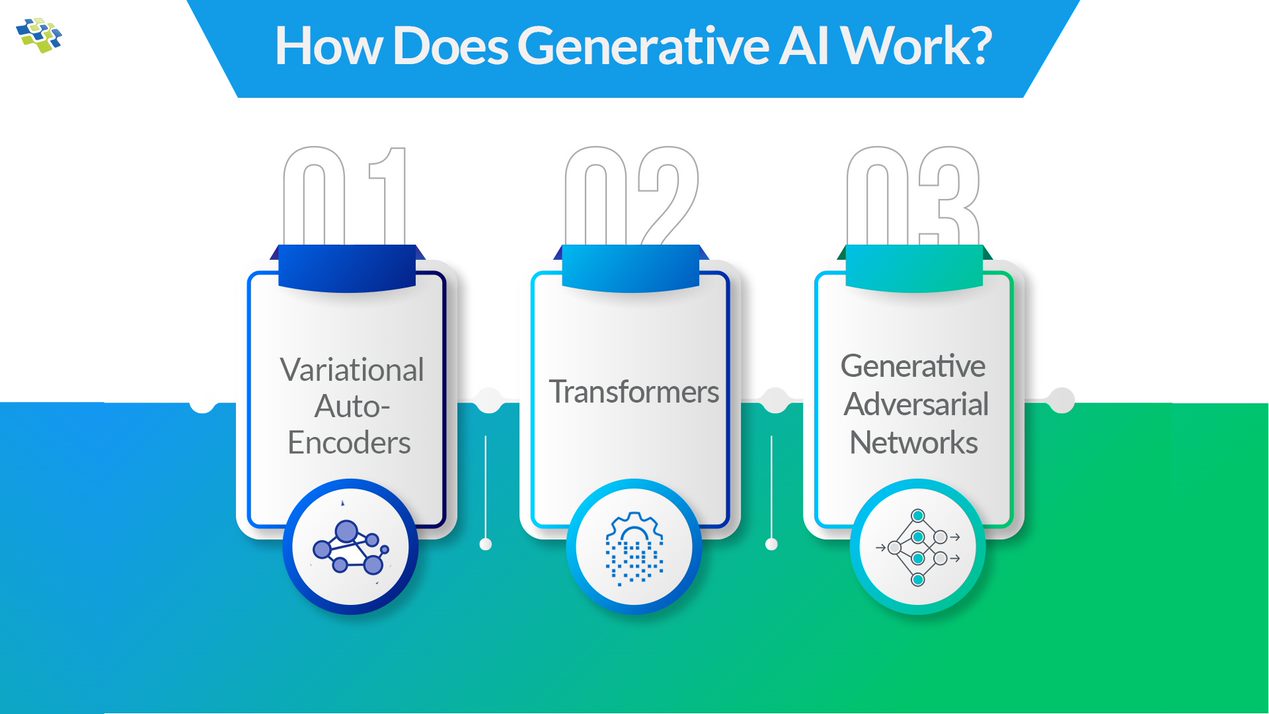How Generative AI Tools Like ChatGPT Could Transform Your Business?
Generative AI can increase productivity, efficiency, reduce costs, and create new growth opportunities by automating tasks previously done manually. Advances in Generative AI tools such as ChatGPT and GitHub Copilot, exhibit creativity by generating original content based on user interactions and data processing. These machines can write code, document text content, and even identify the root cause of production problems, expanding the possibilities for human-machine collaboration.

Generative AI is widely acknowledged as a transformative and swiftly advancing technology in today’s market. Projections suggest that by 2025, the proportion of data generated by Generative AI will soar to 10%, which represents a substantial increase from the current fraction of less than 1%. – Gartner
This blog delves into the diverse applications of Generative AI, with a particular focus on the versatile tools like ChatGPT, across various sectors.
What Exactly Is Generative AI?
Generative AI encompasses any AI system capable of producing novel text, photos, videos, audio, code, or synthetic data. While ChatGPT and deep fakes have emerged as notable examples of Generative AI, the technology’s origins can be traced to the automation of laborious digital image and audio correction tasks. Furthermore, one could contend that, machine learning and deep learning are also forms of Generative AI, as they center around generative processes at their core.
How Does Generative AI Work?
Generative AI possesses the remarkable ability to morph into novel forms. This technology primarily leverages neural networks, including GANs, transformers, and variational auto-encoders, to craft fresh output from input data. Unlike discriminative AI algorithms that aim to classify incoming data based on their learned knowledge, Generative AI algorithms employ a modelling approach to develop synthetic data and arrive at their conclusions based on training data. There are three primary methods, including:
 1. Variational Auto-Encoders
1. Variational Auto-Encoders
Generative AI incorporates compression techniques within its deep learning methodology. This methodology entails the encoder compressing the input data through pre-existing patterns and structures before attempting to reconstruct the output by reducing the reconstruction error. The technique has numerous applications, including dimensionality reduction, image compression, anomaly detection, and feature extraction. The potential applications of generative AI are manifold, ranging from generating novel articles and generating realistic images to enhancing low-quality photographs, producing code without manual intervention, and extracting new images from textual descriptions, among other possibilities.
2. Transformers
Transformers are a class of neural networks that have been refined over time to produce the most convincing responses by leveraging vast datasets.
Models like GPT-3, laMDA, and Wu-Dao employ transformers to simulate cognitive attention and evaluate the importance of each element of the input data. For example, ChatGPT is said to have over 175 billion parameters, enabling it to generate fresh content with remarkable accuracy.
3. Generative Adversarial Networks
Generative AI employs texts and images to generate multimedia content, accomplished through a dual neural network system composed of a generator and a discriminator. The generator network fabricates fresh material that emulates the original training data, while the discriminator network evaluates the extent to which the generator-created output matches the actual training dataset.
Generative AI Use Cases by Industry
Sophisticated AI technologies such as ChatGPT have the power to revolutionize numerous sectors. Some illustrative instances include:

1. Healthcare
Generative AI is increasingly being leveraged to create realistic and precise synthetic medical images, which are then utilized to train deep learning algorithms in the field of medical imaging. By leveraging the capabilities of advanced AI diagnostic tools, healthcare practitioners can scrutinize medical data and images with exceptional precision, consequently facilitating the early detection of diseases and conditions. This can result in superior patient outcomes, thereby revolutionizing the medical industry. By harnessing the power of Generative AI, healthcare professionals can access an unparalleled level of precision and efficiency, enabling them to provide higher quality care to patients.
2. Customer Service
AI-driven chatbots can provide timely, personalized support and guidance to customers in real-time, reducing wait times for them and improving their entire experience. Chat bot powered by prompt engineering can make a huge impact by asking and answering right responses. Chatbots can understand and address a wide range of consumer questions and issues by utilizing natural language processing and machine learning algorithms. This increases customer happiness and results in significant cost savings for enterprises.
Further read: How Can Artificial Intelligence Transform Your Retail Business?
3. Finance
Generative AI is frequently used in the financial sector to create financial reports, automate trading plans, and spot market patterns. Advanced AI trading algorithms can examine enormous quantities of data to anticipate market patterns and provide valuable insights for informed investment decisions. This can potentially yield higher returns, making them an essential tool for investors and traders alike.
4. Marketing
With the aid of innovative AI analytics tools, businesses can scrutinize and comprehend customer behaviour and preferences with exceptional accuracy, empowering them to design more personalized and effective marketing strategies. These AI-powered tools can identify patterns and trends in vast quantities of data, providing valuable insights into customer preferences and behaviours. By leveraging this information, businesses can tailor their marketing campaigns to reach the most receptive audience, resulting in increased brand loyalty, customer satisfaction, and higher conversion rates.
5. Supply Chain Management
The supply chain industry may undergo a considerable transition because of the adoption of innovative technology like Generative AI and sophisticated language models like ChatGPT. By utilizing these solutions, organizations may enhance demand forecasting, enhance inventory management, cut down on waste, and expedite stakeholder communication.
Businesses can accurately predict demand trends because of Generative AI’s capacity to analyze enormous amounts of data from several sources, and ChatGPT’s ability to offer real-time support and help can enhance communication and collaboration across the supply chain.
Further read: How Can Artificial Intelligence Transform Your Retail Business?
Wrapping Up
In conclusion, the potential benefits of Generative AI tools such as ChatGPT for businesses are manifold. By leveraging these innovative technologies, companies can enhance customer experience, improve internal processes, and gain a competitive edge in the market.
Looking to leverage the power of AI and other innovative technologies to drive growth and innovation for your business? Look no further than NextGen Invent, a leading app development company specializing in developing custom AI solutions for businesses across a wide range of industries. Our team of experts has the experience and expertise needed to develop tailored AI solutions that meet your specific business needs.
Contact us today to discover how we can help take your business to the next level.
Stay In the Know
Get Latest updates and industry insights every month.
 1. Variational Auto-Encoders
1. Variational Auto-Encoders